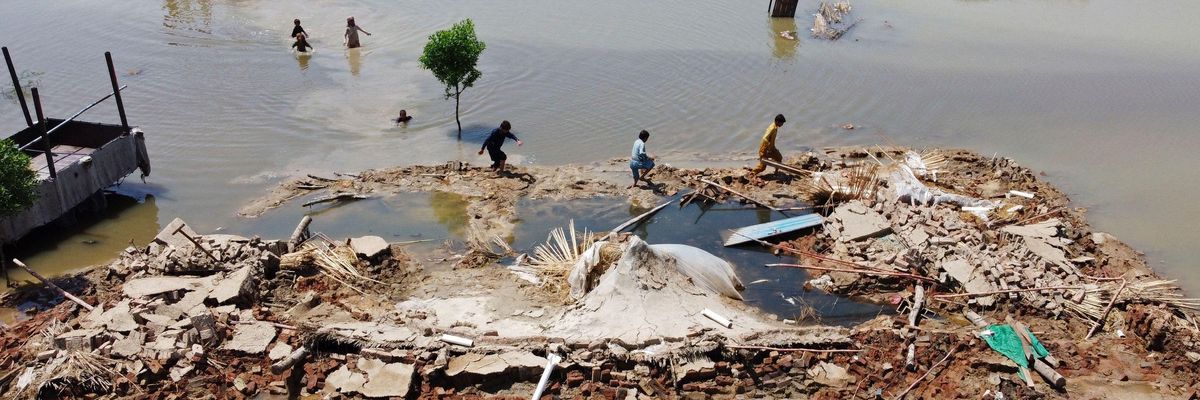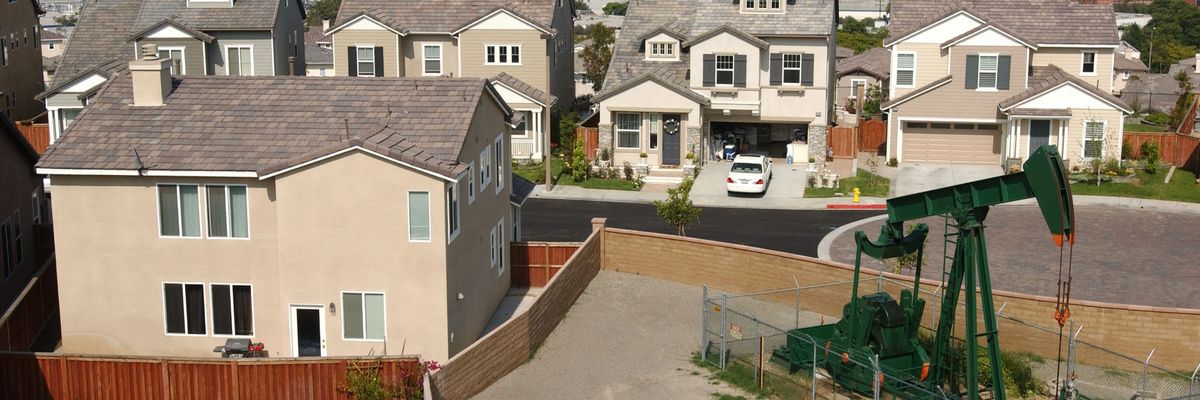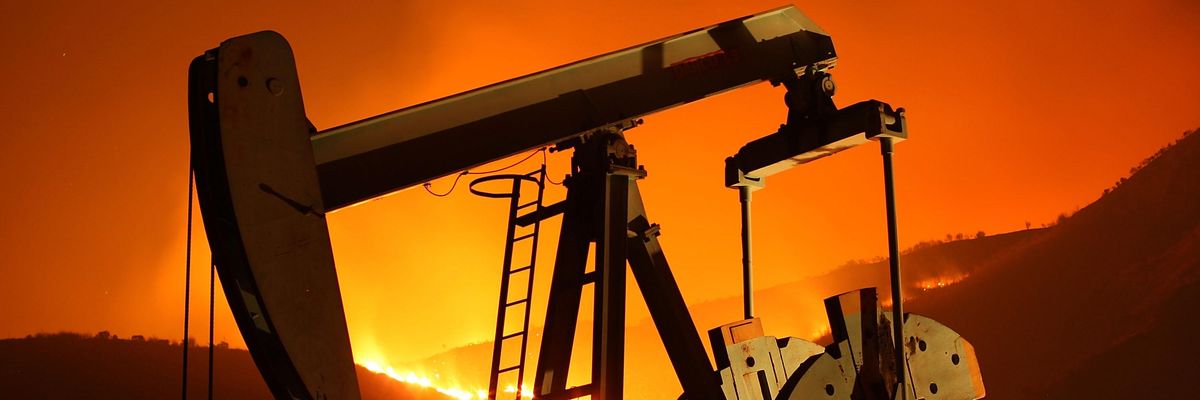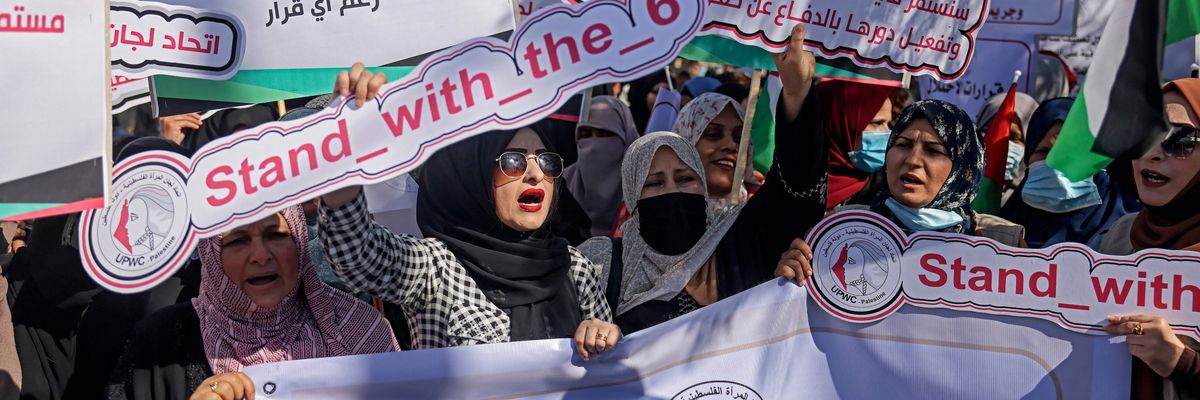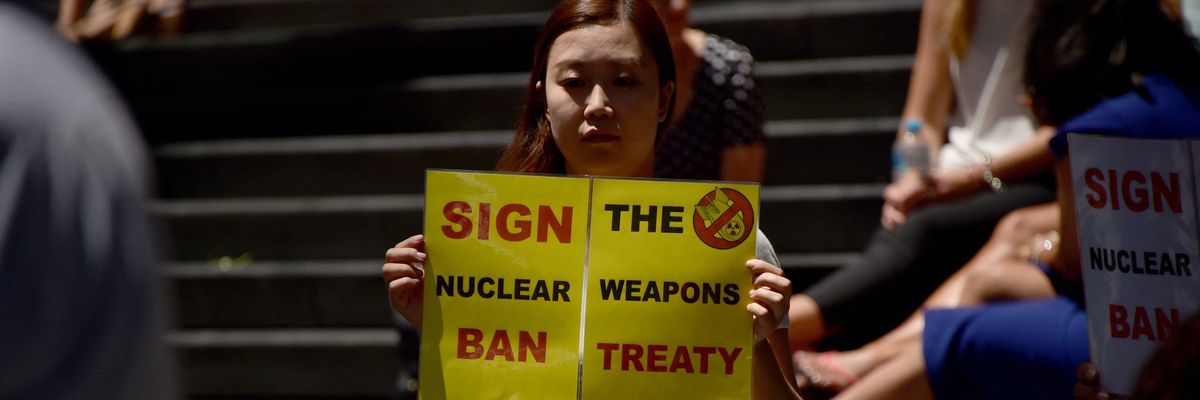Banks should "abandon the project and instead inject financing into safe, sustainable, community-centered renewable energy solutions to foster a just transition away from fossil fuels in Africa," said one advocate.

People gather outside Standard Bank's offices in Johannesburg, South Africa on June 12, 2023.
(Photo: StopEACOP/Twitter)
KENNY STANCIL
Jun 12, 2023
Hundreds of climate justice activists on Monday descended upon Standard Bank's offices in Johannesburg, South Africa, where they implored the financial institution to stop backing the proposed East African Crude Oil Pipeline and other harmful fossil fuel projects.
The protest, held during Standard Bank's annual general meeting, sought to draw shareholders' attention to the deleterious effects of the East African Crude Oil Pipeline (EACOP) and persuade them to call on the bank to publicly withdraw its support for the development of such polluting infrastructure.
It was organized by the #StopEACOP coalition, which wants the bank not only to divest from EACOP and multiple liquefied natural gas (LNG) projects in Mozambique but also to redirect that money toward renewables to increase regional access to clean energy.
"With a powerful collective of South African activists and community organizations raising their voices to demand Standard Bank's withdrawal of support for EACOP, it is long overdue for the bank to pause and genuinely listen," the coalition's coordinator, Zaki Mamdoo, said in a statement. "They cannot assume they can sponsor the destruction of other African nations without intervention from South Africans. Today, their misconception has been shattered—our actions against Standard Bank will only intensify until they fully abandon EACOP and all similar projects."
EACOP's aim is to transport heated crude oil nearly 900 miles through Uganda and Tanzania, where it would be shipped from Port Tanga through the Suez Canal to refineries in the Dutch city of Rotterdam and subsequently burned. As Common Dreams has reported, experts estimate that if completed, the project would generate 379 million tonnes of planet-heating emissions over 25 years, threaten biodiversity hotspots, and endanger the Lake Victoria basin on which more than 40 million people depend.
To get started, the project's developers—France-based TotalEnergies and the China National Offshore Oil Corporation, working alongside Ugandan and Tanzanian state-owned oil firms—are seeking a $3 billion loan from some of the largest commercial banks in the world.
Standard Bank, through its subsidiary Stanbic Uganda, and the Industrial and Commercial Bank of China are acting as the project's financial advisers. According to 350Africa.org, "These banks are expected to serve as lead arrangers, meaning that they will need to approach other banks to co-finance the deal and are actively raising funds to see EACOP constructed."
Inside the shareholder meeting, Standard Bank CEO Sim Tshabalala indicated, in response to questions from Khaliel Moses of 350Africa.org, that the bank "will be providing finance directly" to EACOP. However, when asked for clarification, the bank's chair, Nonkululeko Nyembezi, responded that no decision had yet been made on financing the project. "What you are hearing perhaps is directionally how personally I am leaning," she said, confirming that the bank is still seriously considering lending to EACOP despite sustained opposition to it.
The #StopEACOP coalition said Monday that "the detrimental impacts of EACOP are already evident, even before the physical construction of the pipeline" has begun. Communities in Uganda and Tanzania "have experienced the irregular loss of land, undermining livelihoods and exacerbating land degradation," the coalition noted. "The mere presence of EACOP has caused disruption, fear, and uncertainty among local populations who rely on the land for their sustenance and cultural heritage."
"This pre-construction phase highlights the urgent need for Standard Bank to withdraw its support, as the project's continuation would only amplify these negative consequences, further jeopardizing the well-being of communities and the fragile ecosystem," #StopEACOP continued. "The bank needs to recognize the alarming implications of EACOP and take a responsible stance to protect both people and the environment."
At the shareholder meeting, meanwhile, Earthlife Africa director Makoma Lekalakala presented Standard Bank executives with a certificate of human rights violations on behalf of the communities already affected by EACOP.
"Standard Bank still doesn't get that financing EACOP poses huge risks, not just to the communities it is supposed to serve, but also to the bank itself," said Ryan Brightwell, director of communications and research at BankTrack. "This is why their co-advisers SMBC [Sumitomo Mitsui Banking Corporation] have stepped away, and 25 other major banks have declared they won't touch the project. The bank protests outside the bank's annual meeting are getting larger yearly—they would be well advised to listen."
In addition to advising EACOP, Standard Bank has also provided $485 million in financing to Mozambique LNG in Cabo Delgado, a project led by TotalEnergies, and it has also so far refused to rule out funding Rovuma LNG, another fracked gas project in Mozambique.
"As a financier of TotalEnergies' $24 billion Mozambique LNG, Standard Bank is complicit in its devastation and fueling a war that has left thousands dead and a million displaced," said Anabela Lemos, director of environmental justice at Friends of the Earth Mozambique. "Entire communities in Cabo Delgado have been displaced and lost everything, a UNESCO Biosphere will be destroyed, and emissions just from the construction phase will irreversibly damage the climate. With the project still on pause, Standard Bank has the opportunity, and the responsibility, to stop enabling violence and pushing the country even deeper into a debt spiral by canceling its financing."
Diana Nabiruma of the Africa Institute for Energy Governance in Uganda rejected as "erroneous" Standard Bank's argument that its continued fossil fuel financing is meant "to promote economic development and address energy poverty."
"Available evidence indicates that frontline communities suffer economic setbacks due to losing their land and other economic assets, which aren't compensated adequately and fairly," said Nabiruma. "Oil-producing countries such as Nigeria also have the most number of people without access to electricity and most of the oil from Uganda and gas from Mozambique is meant for export."
In the words of Lekalakala from Earthlife Africa, "Standard Bank has to wake up to the reality that gas and oil are not and cannot be transitional fuels towards a low-carbon development."
That sentiment was echoed by 350Africa.org regional campaigner Charity Migwi, who said that "the financial institutions supporting the fossil fuel industry are fueling the climate crisis."
A recent report showed that since 2016, the year the Paris agreement took effect, the world's 60 largest private banks have provided $5.5 trillion in financing to the fossil fuel industry, flouting their pledges to put themselves and their clients on a path to "net-zero" greenhouse gas emissions as the window to avert the worst effects of the climate crisis rapidly closes.
"These institutions must reconsider their responsibility to the communities within the areas in which they work, which are on the frontlines of the climate crisis, experiencing extreme, crippling weather events," Migwi continued. "Rather than expose communities to the harmful effects of projects such as EACOP, we call on Standard Bank and other banks involved in the East African Crude Oil Pipeline to abandon the project and instead inject financing into safe, sustainable, community-centered renewable energy solutions to foster a just transition away from fossil fuels in Africa."

